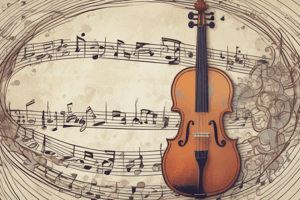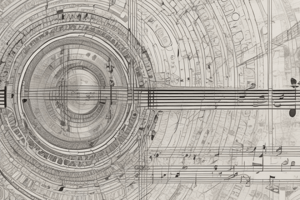Podcast
Questions and Answers
All music elements of sound of time.
All music elements of sound of time.
False (B)
All music must be pretty or beautiful.
All music must be pretty or beautiful.
False (B)
Music can have a larger purpose than to sound pleasing.
Music can have a larger purpose than to sound pleasing.
False (B)
A good definition for music includes subjective factors.
A good definition for music includes subjective factors.
The physical characteristics of music involve physics, mathematics, and engineering.
The physical characteristics of music involve physics, mathematics, and engineering.
The science of acoustics is typically not used with musical instrument construction.
The science of acoustics is typically not used with musical instrument construction.
Porous materials will bounce sound waves around a room.
Porous materials will bounce sound waves around a room.
Dense materials will absorb sound waves.
Dense materials will absorb sound waves.
Music that lacks forward energy may seem static.
Music that lacks forward energy may seem static.
As opposed to highly structured art music, children's songs rarely communicate a wide range of feelings.
As opposed to highly structured art music, children's songs rarely communicate a wide range of feelings.
Music should never be used as purely functional.
Music should never be used as purely functional.
Music can have attributes of both folk and classical music.
Music can have attributes of both folk and classical music.
Generally, Western European music is the only style we consider art music.
Generally, Western European music is the only style we consider art music.
Music from any culture is a reflection of the society that created it.
Music from any culture is a reflection of the society that created it.
The existence of music among all peoples is a fairly recent event in history.
The existence of music among all peoples is a fairly recent event in history.
Musical languages, styles, and functions really differ very little among various cultures.
Musical languages, styles, and functions really differ very little among various cultures.
All cultures have music because of its power to stimulate emotional responses.
All cultures have music because of its power to stimulate emotional responses.
Aesthetic responses can be universal or culture-specific.
Aesthetic responses can be universal or culture-specific.
Music can evoke unpleasant associations.
Music can evoke unpleasant associations.
Music therapists use music to alter people's feelings.
Music therapists use music to alter people's feelings.
Background music promotes passive listening.
Background music promotes passive listening.
Public performers rarely need a motivating force.
Public performers rarely need a motivating force.
Performing has its own creative element.
Performing has its own creative element.
A performer's interpretation shouldn't add anything to a composer's notation.
A performer's interpretation shouldn't add anything to a composer's notation.
Performing can be intended only for the performers themselves.
Performing can be intended only for the performers themselves.
Many people will learn to read music notation.
Many people will learn to read music notation.
The elements of music are pitch, duration, loudness, and melody.
The elements of music are pitch, duration, loudness, and melody.
Small, thin instruments are higher in pitch than big, wide instruments.
Small, thin instruments are higher in pitch than big, wide instruments.
Placing accents on weak beats or parts of beats produces syncopation.
Placing accents on weak beats or parts of beats produces syncopation.
The loudness or softness of music is referred to as timbre.
The loudness or softness of music is referred to as timbre.
Variety creates a sense of contrast.
Variety creates a sense of contrast.
Repetition creates a sense of contrast.
Repetition creates a sense of contrast.
An unstable feeling will drive the music forward to a point of relative stability.
An unstable feeling will drive the music forward to a point of relative stability.
Many American popular and religious songs are written in verse-chorus form.
Many American popular and religious songs are written in verse-chorus form.
Twelve-bar blues is a form derived from a style of American folk song called jazz.
Twelve-bar blues is a form derived from a style of American folk song called jazz.
Much 20th century classical music emphasizes melody over rhythm and timbre.
Much 20th century classical music emphasizes melody over rhythm and timbre.
Music is:
Music is:
__________ can be used to create music.
__________ can be used to create music.
The principles of acoustics can involve such terms as:
The principles of acoustics can involve such terms as:
An audio enthusiast will want a speaker system with the __________ frequency response.
An audio enthusiast will want a speaker system with the __________ frequency response.
Acoustical engineers design auditoriums according to principles like:
Acoustical engineers design auditoriums according to principles like:
The acoustics of a room are considered __________ when sound waves are absorbed.
The acoustics of a room are considered __________ when sound waves are absorbed.
To appreciate music it is important to ___________ what happened before, and __________ what is about to happen.
To appreciate music it is important to ___________ what happened before, and __________ what is about to happen.
Music is an art and:
Music is an art and:
Regardless of its style, good music:
Regardless of its style, good music:
A great piece of music encourages repeated:
A great piece of music encourages repeated:
Musical stylistic differences among cultures come from:
Musical stylistic differences among cultures come from:
Music can stimulate:
Music can stimulate:
Music therapists can help people:
Music therapists can help people:
___________ in music is the use of written symbols to represent musical sounds.
___________ in music is the use of written symbols to represent musical sounds.
Most creators usually create music that is:
Most creators usually create music that is:
Which of the following makes more use of improvisation?
Which of the following makes more use of improvisation?
When people perceive a single tone we call it:
When people perceive a single tone we call it:
The __________ the frequency, the higher the pitch; the __________ the frequency, the lower the pitch.
The __________ the frequency, the higher the pitch; the __________ the frequency, the lower the pitch.
A sequence of pitches occurring one after another is perceived:
A sequence of pitches occurring one after another is perceived:
Instrumental melodies usually can have __________ than vocal melodies.
Instrumental melodies usually can have __________ than vocal melodies.
Tonality refers to:
Tonality refers to:
Harmony is perceived:
Harmony is perceived:
The system of using chords in American music is known as:
The system of using chords in American music is known as:
We usually hear three or more simultaneous sounds as a:
We usually hear three or more simultaneous sounds as a:
Music moves through:
Music moves through:
The variety of changes in the duration of pitches creates:
The variety of changes in the duration of pitches creates:
Pulse refers to the __________ of the music.
Pulse refers to the __________ of the music.
Strong, weak, strong, weak is an example of:
Strong, weak, strong, weak is an example of:
Strong, weak, weak, strong, weak, weak is an example of:
Strong, weak, weak, strong, weak, weak is an example of:
__________ music has no pulse, a weak pulse, or an irregular pulse.
__________ music has no pulse, a weak pulse, or an irregular pulse.
__________ has a clear pulse, with strong beats occurring in different patterns.
__________ has a clear pulse, with strong beats occurring in different patterns.
__________ intensity generates a louder sound.
__________ intensity generates a louder sound.
In Western classical music instruments are classified according to their:
In Western classical music instruments are classified according to their:
Tension followed by a release of tension produces:
Tension followed by a release of tension produces:
Texture in Western music can refer to:
Texture in Western music can refer to:
Form is frequently depicted by:
Form is frequently depicted by:
32-bar song form is found in:
32-bar song form is found in:
__________ give a feeling of temporarily stopping with the sense that the music will continue.
__________ give a feeling of temporarily stopping with the sense that the music will continue.
__________ convey a strong feeling of finality.
__________ convey a strong feeling of finality.
The science of sound and the physical basis of music.
The science of sound and the physical basis of music.
The rate of speed of sound waves.
The rate of speed of sound waves.
Helps music move forward.
Helps music move forward.
Music for the masses.
Music for the masses.
Music for the elite.
Music for the elite.
The study of the emotional and expressive aspects of music.
The study of the emotional and expressive aspects of music.
Can improve our feelings when we're alone.
Can improve our feelings when we're alone.
When music is notated.
When music is notated.
Simultaneously created and performed.
Simultaneously created and performed.
Listening to music attentively.
Listening to music attentively.
The relative highness or lowness of sound.
The relative highness or lowness of sound.
How long a pitch lasts.
How long a pitch lasts.
Determined by intensity or energy.
Determined by intensity or energy.
Determined by the shape of sound waves.
Determined by the shape of sound waves.
The entire range of frequencies sounding at once.
The entire range of frequencies sounding at once.
The absence of frequencies.
The absence of frequencies.
The shape of a melody.
The shape of a melody.
A system of organizing pitches.
A system of organizing pitches.
A complete musical thought.
A complete musical thought.
The rate of speed.
The rate of speed.
The organizing of beats.
The organizing of beats.
One group of beats.
One group of beats.
The first beat of each bar.
The first beat of each bar.
Increased stress.
Increased stress.
The distinctive tonal quality of an instrument or voice.
The distinctive tonal quality of an instrument or voice.
Flashcards are hidden until you start studying
Study Notes
Music Elements and Definitions
- Music encompasses all elements of sound and time.
- Not all music needs to be aesthetically pleasing or beautiful.
- Music can serve purposes beyond mere auditory pleasure.
- Subjective factors are integral to defining music.
- The physical characteristics of music require understanding of physics, mathematics, and engineering.
Acoustics and Sound Properties
- Acoustics plays a significant role in the construction of musical instruments.
- Porous materials enhance sound by bouncing waves around a space.
- Dense materials, contrary to earlier beliefs, actually absorb sound waves.
- Music that lacks energy may appear static and unengaging.
Music's Relationship with Culture and Emotion
- Children's songs can express a wide range of emotions, similar to structured art music.
- Music should not be strictly functional; it can serve diverse roles in society.
- Music reflects the society from which it originates and is influenced by cultural dynamics.
- The belief that musical languages and styles are nearly identical across cultures is incorrect, as significant differences exist.
Music Therapy and Emotional Impact
- All cultures utilize music for its power to evoke emotional responses.
- Aesthetic responses to music can be both universal and culturally specific.
- Music can trigger unpleasant memories or associations.
- Music therapists leverage music to enhance self-esteem and emotional well-being.
Listening and Performance Dynamics
- Background music encourages a passive listening experience.
- Performers often require motivation, especially in public settings.
- A performer's interpretation can enhance a composer's notation, adding depth to the performance.
Musical Elements and Concepts
- Not all individuals learn to read music notation.
- Key music elements include pitch, duration, and rhythm, while the loudness of music is related to intensity, not timbre.
- Small, thin instruments tend to produce higher pitches compared to larger, thicker ones.
- Syncopation occurs when accents are placed on weak beats or parts of beats.
Musical Structures
- Variety in music provides contrast, while repetition does not.
- An unstable musical feeling promotes forward motion towards resolution.
- The twelve-bar blues form is rooted in folk traditions, but is distinct from jazz.
- Many American songs, particularly popular and religious, follow a verse-chorus structure.
Acoustics and Audio Engineering
- Acoustical engineers focus on aspects like resonance and reverberation when designing performance spaces.
- The ideal acoustics in a space are referred to as "dead," indicating sound absorption.
- Good music is characterized by longevity and often appeals universally, irrespective of style.
Genre and Cultural Differences
- Music stylistic differences arise from cultural variations in the use of music, instruments, and creative methods.
- Music stimulates both physical and psychological reactions, affecting listeners in multifaceted ways.
- Background music can enhance emotions in solitary settings while notating music is referred to as the score.
Musical Notation and Perception
- Notation is essential for documenting music, while improvisation is a core element of jazz.
- Pitch is recognized as the relative highness or lowness of sound; duration indicates how long a pitch lasts.
- Loudness reflects the energy of a sound, influenced by the intensity of sound waves.
Cultural Considerations and Music Theory
- Music operates through time and incorporates rhythm, meter, and tempo as organizing principles.
- Different bar structures define musical timing, with downbeats marking the beginning of each measure.
Music's Emotional and Theoretical Aspects
- The tension and release experienced in music generate a sense of forward momentum.
- Music’s texture can range from thick and full to thin and transparent, enriching the listening experience.
- Cadences in music create feelings of stopping or finality, shaping listeners' expectations and experiences.
Studying That Suits You
Use AI to generate personalized quizzes and flashcards to suit your learning preferences.




